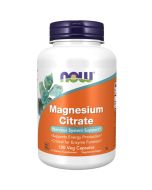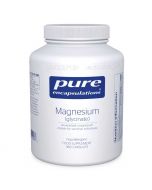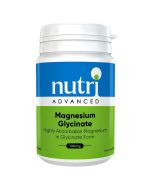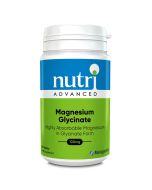
Is it better to take magnesium citrate or magnesium glycinate?
Magnesium is an essential mineral that is vital to various aspects of our health including nerves, bones, muscles, blood pressure, and can even help with our mood, relaxation, and sleep.
Signs of magnesium deficiency
Many individuals are magnesium deficient without being aware, the most common symptoms of deficiency includes:
- Muscle cramps and weakness
- Low appetite
- Numbness
- Fatigue
- Irregular heartbeat (cardiac arrhythmia)
- Difficulty resting and/or sleeping
- Headaches and migraines
- PMS (premenstrual syndrome)
What magnesium supplement is best?
There are many forms of magnesium that come in dietary supplements, the most common being magnesium oxide. Magnesium oxide contains a higher magnesium content, it is more readily available and cost effective compared to other forms of magnesium; however, the problem is that is less bioavailable.
Low bioavailability means that magnesium oxide is not easily absorbed by our body, with less entering our blood stream, and this can also result in gastrointestinal issues such as diarrhoea.
Why should you take magnesium glycinate or magnesium citrate instead of magnesium oxide?
Magnesium citrate and magnesium glycinate are preferred over magnesium oxide several reasons, the key markers are:
1. High Bioavailability
These forms of magnesium are absorbed better in the intestines. High bioavailability allows the body to benefit more from the supplementation and you can expect to notice a visible difference to your health and wellbeing.
2. Gentle on the stomach
The high bioavailability of both magnesium citrate and magnesium glycinate creates minimal room for gastrointestinal discomfort that may come with magnesium oxide.
3. Targeted Benefits
Both magnesium citrate and magnesium glycinate are often used to target specific health concerns. Magnesium glycinate is best for calming and relaxing the body, whereas magnesium citrate is better to relieve constipation and encourage bowel movement.
The difference between Magnesium Glycinate and Magnesium Citrate
Both forms of magnesium are chelated with different compounds, and this is what makes work differently in the body. Whilst the conventional benefits of magnesium are prevalent in all forms of magnesium, if you are wondering which form is better for you, consider your individual needs and considerations.
Magnesium Glycinate
Magnesium glycinate supplements are a combination of magnesium with the amino acid glycine.
Supports the synthesis of collagen
Glycine is contributes to the synthesis of proteins and is a key component that makes up collagen, supporting our bodies tissues and organs. Therefore, magnesium glycinate acts as a crucial co-factor in protein formation, supporting the production of collagen crucial for skin, tendons, and bones. This makes magnesium glycinate beneficial for promoting tissue health, wound healing, and maintaining connective tissue strength.
Aids Relaxation and calmness
Magnesium glycinate aids relaxation and sleep by playing a dual role in supporting both magnesium and glycine functions. Chelated with the amino acid glycine, it enhances magnesium absorption and enhances the calming effects of glycine on the central nervous system. This combination promotes a serene state, helping to alleviate stress and anxiety, leading to improved sleep quality.
Suitable for sensitive stomachs
This form of magnesium is ideal for sensitive stomachs, minimising the risk of gastrointestinal discomfort. The chelation process, binding magnesium to glycine, reduces the likelihood of laxative effects associated with other magnesium compounds.
Magnesium Citrate
Magnesium citrate supplements are formulated by combining magnesium with citric acid.
Hydration support
The osmotic effect (the flow of water to areas that need it ) of magnesium citrate may help relax blood vessels and reduce the severity of headaches and migraines. When taken appropriately, magnesium citrate can help to maintain fluid balance in the body.
Eases constipation
Magnesium citrate is able to draw water to the intestines to encourage bowel movements and muscle contractions, softening stools and to easing other gastrointestinal issues like constipation.
Kidney stone prevention
Magnesium citrate may help to prevent kidney stones by attaching to oxalates in the urine, stopping them from forming crystals and helping the body get rid of them. This process keeps minerals in the kidneys balanced and may lower the risk of developing kidney stones.
Summary
Both magnesium citrate and magnesium glycinate will provide the elemental benefits of magnesium, but the way that they are formed is what make their uses different. Choose magnesium citrate to elevate your overall magnesium levels and promote digestive regularity. If you are seeking improved sleep, enhanced calmness, muscle relaxation, or mood support, consider Magnesium Glycinate as a tailored option.
Magnesium glycinate vs. citrate infographic
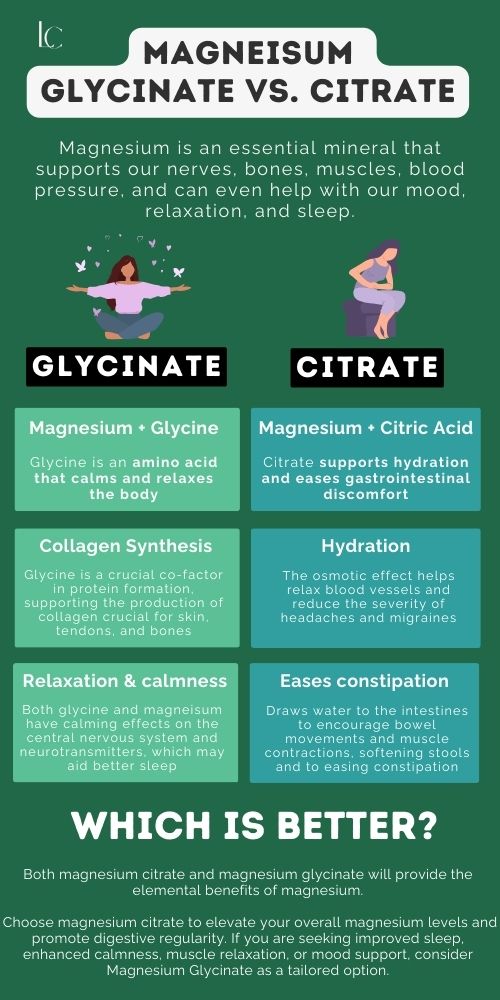
References
https://pubmed.ncbi.nlm.nih.gov/2407766/
https://ods.od.nih.gov/factsheets/Magnesium-HealthProfessional/
https://www.ncbi.nlm.nih.gov/pmc/articles/PMC6153947/
https://pubmed.ncbi.nlm.nih.gov/16542786/
https://pubmed.ncbi.nlm.nih.gov/10634161/
https://www.ncbi.nlm.nih.gov/pmc/articles/PMC5418413/
By Rhysa Phommachanh, BA (HONS) Bachelor of Arts + Head of Digital





